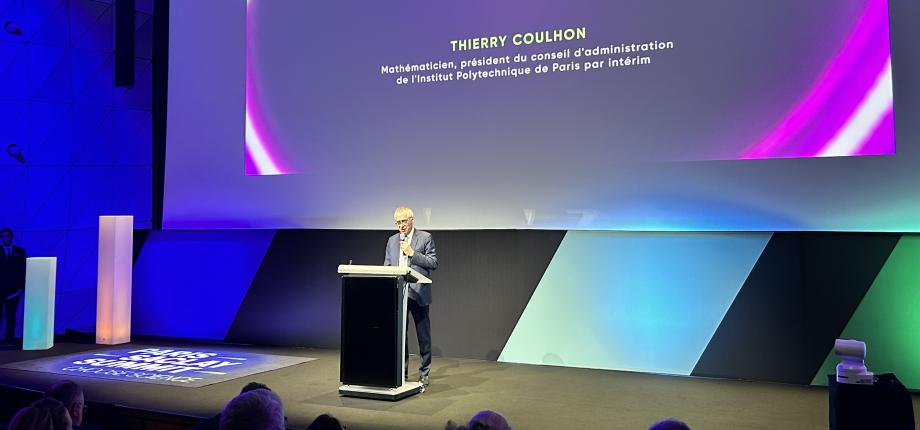Thierry Coulhon: "Building a global center of excellence in France"

Thierry Coulhon, acting Chairman of the Board of Directors of Institut Polytechnique de Paris (IP Paris), gave the keynote speech on March 1 for the second day of the Paris-Saclay Summit - Choose Science. The topic was "Higher education, research and innovation: global players on the Saclay plateau?"
In partnership with IP Paris, the first Paris-Saclay Summit was born out of a shared desire by the weekly magazine Le Point, the Île-de-France region, the Paris-Saclay conurbation community and the Essonne department to showcase French excellence and the global reach of public and private research.
Scientists, researchers, business leaders, academics, politicians, students and representatives of civil society met on February 29 and March 1 at EDF Lab Paris-Saclay.
In his speech, Thierry Coulhon outlined the main factors fuelling the academic success of the Plateau de Saclay cluster, before turning his attention firmly to the ambition of IP Paris: to build a world-class higher education, research and innovation cluster on the plateau.
"From an academic point of view, the Paris-Saclay cluster is now based on two world-class institutions, Université Paris Saclay and Institut Polytechnique de Paris, supported by research organizations such as the CNRS, CEA, INRIA, INSERM, Onera and INRAE," he said, adding: "These two clusters are the foundation of France's international excellence. It is absolutely crucial for the country that both groups succeed."
The power to change the world
"We know what society expects of our higher education institutions: to help future generations in finding solutions to the great challenges that we face, and to rebuild hope, through science and rationality," assured Thierry Coulhon. "IP Paris students have the power to change the world, they also have a duty to do so, and they know it."
How can we achieve this, and build a global center of excellence in France? This was the question that the acting Chairman of IP Paris set out to answer using the Institute as an example, detailing its strengths and levers.
IP Paris is characterized by three key features: academic excellence, alignment with the country's sovereign interests and close ties with the business world.
IP Paris brings together five prestigious French engineering schools: École Polytechnique, ENSTA Paris, ENSAE Paris, Telecom Paris and Telecom SudParis.
125 startups incubated in 2023
Innovation can be summarized in three figures: 125 startups incubated by 2023, 20 startups from the IP Paris ecosystem in the first French Tech 2030 class, nine unicorns founded by alumni, including Mistral.AI.
Built on a foundation of fundamental research, IP Paris has established interdisciplinary centers. Today, there are six of them, aligned with major sectors: climate, AI, health, security/defense, materials, cultural and creative industries.
But this research-friendly environment is not the only asset that IP Paris can claim for its international recognition. Among them, collective governance, its students "as our most valuable asset", and renowned scientists including physicists Gérard Mourou and Alain Aspect, Nobel Prize winners in 2018 and 2022 respectively. All of these strengths were prominently featured at the Paris-Saclay Summit.
Five IP Paris representatives at the Summit
Laura Chaubard, Managing Director and Acting President of École Polytechnique, took part in the conference entitled "Jamais sans elles: comment convaincre les jeunes femmes de devenir scientifiques et ingénieures" ("Never without them: how to convince young women to become scientists and engineers"). Sylvie Retailleau, Minister of Higher Education and Research, also took part in this debate.
At the close of the Summit, the acting President of l'X also awarded prizes to the winners of the "Point" 2024 Inventors' Prize.
Nicolas Glady, Director of Télécom Paris, took part in a round-table discussion on the theme "Is Europe a world scientific and technological power?"
Physicist Alain Aspect, professor at École Polytechnique-IP Paris and director of research emeritus at CNRS, joined physicist Etienne Klein in discussing the role of chance, work or genius in the origins of major scientific advances.
Laurent Catoire, director of the UCP, ENSTA Paris, IP Paris chemistry and processes unit, spoke about the future of the hydrogen revolution.













